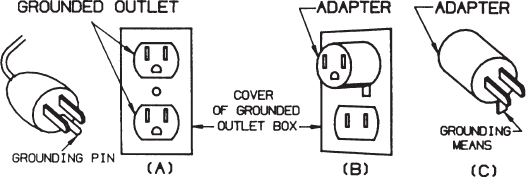
4
7. A marine (boat) battery must be removed and charged on shore. To charge It on board
requires equipment specially designed for marine use.
I. GROUNDING AND AC POWER CORD CONNECTION INSTRUCTIONS
Charger should be grounded to reduce risk of electric shock. Charger is equipped with an
electric cord having an equipment grounding conductor and a grounding plug. The plug
must be plugged into an outlet that is properly installed and grounded in accordance with
all local codes and ordinances.
DANGER - Never alter AC cord or plug provided - if it will not fit outlet, have proper outlet
installed by a qualified electrician. Improper connection can result in a risk of an electric
shock.
This battery charger is for use on a nominal 12-volt circuit, and has a grounding plug that
looks like the plug illustrated in sketch A in Figure 1. A temporary adapter, which looks like
the adapter illustrated in sketches B and C, may be used to connect this plug to a two pole
receptacle as shown in sketch B if a properly grounded outlet is not available. The tempo-
rary adapter should be used only until a properly grounded outlet can be installed by a
qualified electrician.
DANGER - Before using adapter as illustrated, be certain that center screw of outlet plate
is grounded. The green-colored rigid ear or lug extending from adapter must be con-
nected to a properly grounded outlet - make certain it is grounded. If necessary, replace
original outlet cover plate screw with a longer screw that will secure adapter ear or lug to
outlet cover plate and make ground connection to grounded outlet.
FIGURE 1
GROUNDING METHODS
J. OUTPUT CURRENT SELECTOR SWITCH
2 Amp position - may be used for any size battery larger than 10 Ampere hours (AH). This
position is primarily intended for charging batteries between 10 and 30 AH. These are the
types typically used in motor cycles and garden tractors.
10 Amp position - may be used for batteries larger than 30 AH. If used on smaller batter-
ies, gassing, loss of liquid and over heating may occur.
Start position - will assist the battery with up to an additionally 50 Amp while cranking the
engine. This is an intermittent use position and should be limited to a MAXIMUM of 10
seconds on, followed by a MINIMUM of 3 minutes off. For the off period you may switch to
either the 2 or 10 Amp position or disconnect from the AC power source. Applications
drawing more than 50 Amps may automatically interrupt the output circuit breaker in less
than 10 seconds. Do not use this position for charging a battery. Doing so will cause a
safety protector to shut down all functions after 2 minutes of use and remain so for 15 to
20 minutes before resetting. For best results charge the battery for 10 minutes in the 10
Amp position before cranking the engine.














